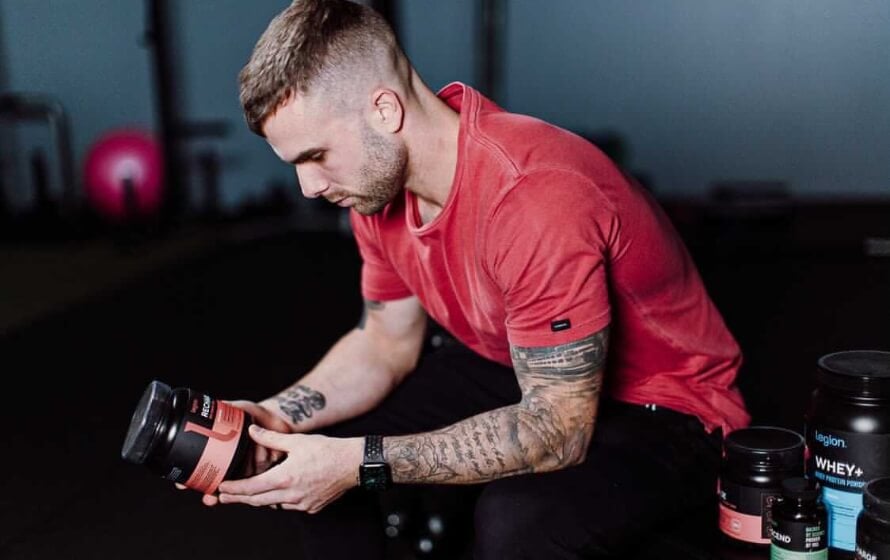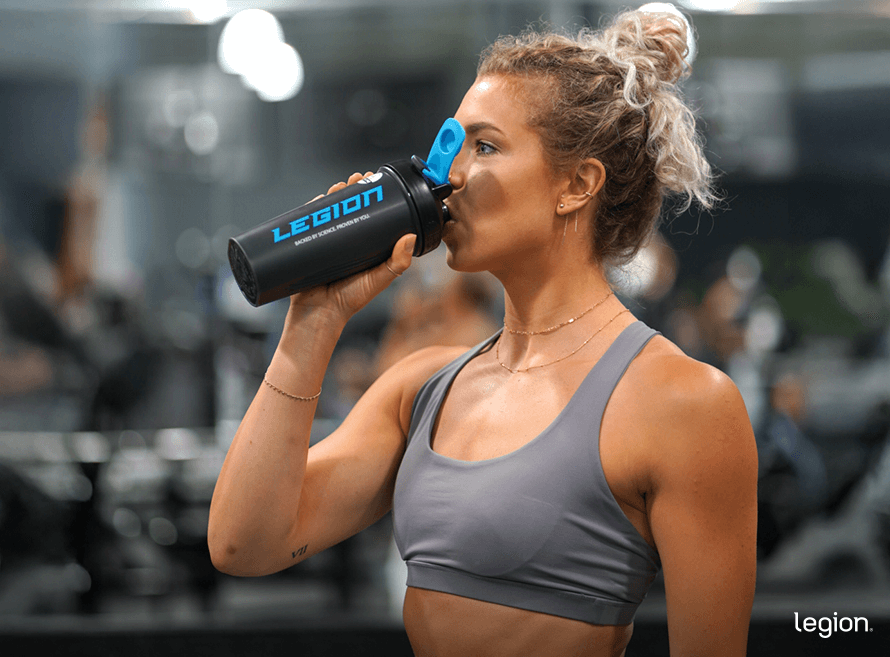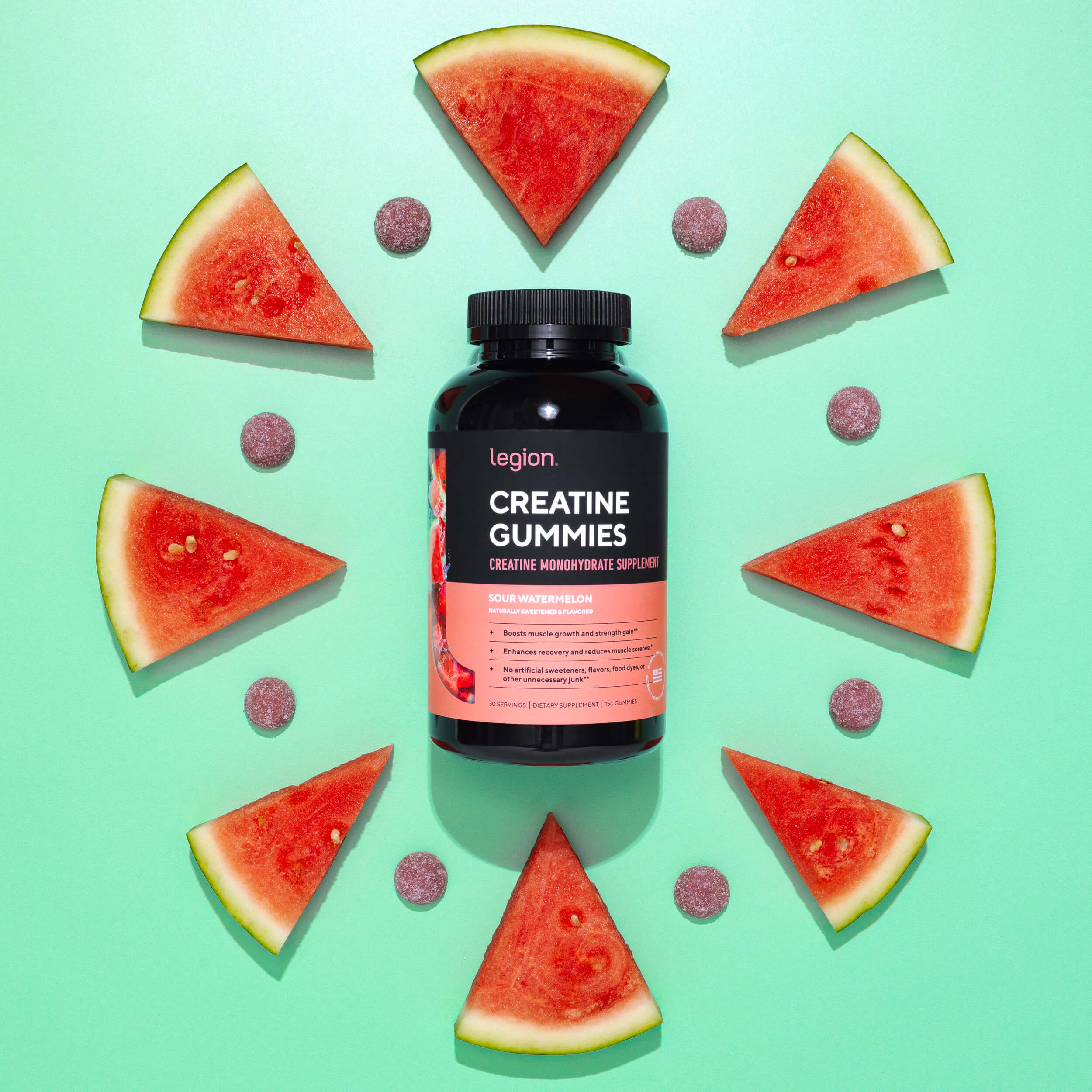Don’t stress about when to take creatine—research shows it works just as well for building muscle whether you take it in the morning, pre- or post-workout, or before bed.
When is the best time to take creatine to gain muscle?
It’s a question plenty of gymgoers want answered.
And you’ll hear no shortage of ideas—before workouts, after workouts, in the morning with carbs, at night before bed. Fortunately, sciences says it’s much simpler than any of this.
You can take creatine whenever it’s convenient and still get the benefits—no need to pair it with a meal, time it around your workout, or chug it soon after waking.
In this article, you’ll learn what actually matters when it comes to creatine timing—and the small, practical differences that might make one option better than another for you.
Key Takeaways
- Don’t stress about when to take creatine—research shows it works just as well for building muscle whenever you take it.
- You can take creatine pre or post workout, though there may be a negligible advantage to taking it after training.
- You can take creatine before bed. It’s not a stimulant, so it won’t keep you awake or interfere with your sleep.
- You can take creatine in the morning. The only time morning might not be ideal is if you’re loading creatine and consuming a lot of caffeine. In that case, consider spacing them out, if it’s easy to do.
- For a pure and potent source of creatine monohydrate, try Legion’s creatine gummies, capsules, miconized powder, or post-workout supplement Recharge.
Table of Contents
+
When to Take Creatine to Maximize Muscle Growth

It probably doesn’t matter when you take creatine. As long as you take it consistently, it will boost muscle growth, recovery, and physical performance.
This is based on a 2022 review published in the journal Frontiers in Sports and Active Living that rounded up all the major studies on creatine timing and found no strong evidence that timing makes a significant difference.
That said, a few practical considerations can make one option better than another, so let’s dig deeper into the research to see what matters.
Should You Take Creatine Pre or Post Workout?

You can take creatine pre or post workout—it probably won’t make much difference.
Some gymgoers say you should take creatine around your workouts because exercise boosts blood flow, which primes your muscles to absorb it more effectively.
They also argue that taking creatine with protein and carbs helps your body absorb and store more of it, so having it with a pre- or post-workout meal is a smart move.
However, a 2021 review published in Nutrients pulled together all the relevant studies comparing creatine timing around workouts. Most found no meaningful difference between taking creatine pre or post workout.
A couple hinted that post-workout might be slightly better for building muscle, but the results were too mixed to draw firm conclusions, and even if there is a benefit, it’s small.
In other words, it probably doesn’t matter whether you take creatine pre or post workout—or even at a completely different time of day. That said, if you want to optimize creatine’s benefits, taking it after training might offer the slightest edge. (Maybe.)
But if that’s not practical, don’t worry about it. What matters far more is simply taking 3-to-5 grams every day.
Can You Take Creatine Before Bed?
Yes—you can take creatine at night. It’s not a stimulant, so it won’t keep you awake or interfere with your sleep.
That said, some people prefer to avoid taking creatine before bed because they don’t want to drink a lot of water before they sleep, since waking up to pee can affect recovery and performance the following day.
If that’s a concern, taking creatine gummies or capsules is an easy workaround that provides all the benefits of powdered creatine without having to drink much or any water.
Interestingly, research shows that taking creatine helped rats stay awake longer and need less sleep after being kept awake.
While reducing sleep duration and quality usually harms mental and physical performance, other studies show that humans taking creatine are mentally and physically sharper, even when sleep-deprived.
Thus, it’s possible (though highly speculative) that creatine could reduce your need for sleep and counteract the drawbacks of sleep deprivation.
Can You Take Creatine in the Morning?

Yes, you can take creatine in the morning. Just avoid combining high doses of creatine (like during a loading phase) and caffeine since it might reduce creatine’s effectiveness slightly.
Studies suggest that combining high doses of both creatine (~20 grams daily, common during a “loading phase”) and caffeine (more than ~350 mg) might blunt creatine’s effects. The exact reason isn’t clear, but researchers have a couple of theories:
- Creatine helps muscles relax faster, which enables you to generate high amounts of force quickly and repeatedly. Caffeine slows this process, which may negate creatine’s benefits.
- Taking large doses of both can cause stomach issues that make it harder to train effectively.
That said, these concerns mostly disappear when you stick to a standard dose of 3-to-5 grams of creatine daily. For example:
- Several studies using pre-workout supplements containing both creatine and caffeine have found improvements in performance and muscle growth.
- One study found that weightlifters taking creatine without caffeine gained slightly more quad muscle than those taking both. But neither group outperformed the placebo in strength, endurance, or total muscle growth, so it’s hard to say caffeine actually interfered with creatine’s benefits.
- Some of the earliest creatine studies had people mix creatine into tea or coffee and it worked perfectly well in those studies.
At bottom, taking creatine in the morning with a coffee is probably fine. The only exception is if you’re loading creatine, in which case it might be worth separating the two, as long as it’s convenient.
What’s the Best Type of Creatine?

You can find dozens of types of creatine on the market—creatine HCL, nitrate, ethyl ester, pyruvate, magnesium chelate, and more.
While most of them enhance performance to a similar degree, there’s one type that stands head and shoulder above the rest: creatine monohydrate.
Creatine monohydrate is the most studied, safe, and reliable form, with over 500 studies backing its benefits. It’s also the most affordable—so there’s no good reason to choose anything else.
If you want to take creatine monohydrate, here are a few Legion products worth considering:
- Powder: Try our pure and potent micronized creatine monohydrate powder that contains no artificial food dyes, fillers, or other unnecessary junk.
- Capsules: If you prefer a portable, mix-free option, the same creatine comes in pre-measured capsules.
- Gummies: If you want something tasty and chewable, our creatine gummies offer the full clinical dose in a sweet treat.
- Post-workout: If you want a natural post-workout supplement containing 5 grams of micronized creatine monohydrate as well as two other ingredients to enhance muscle growth and recovery, try Recharge.
FAQ #1: Does it matter when you take creatine?
It doesn’t really matter when you take creatine. Research shows that creatine works just as well whether you take it in the morning, before or after your workout, or before bed. The most important thing is that you take 3-to-5 grams every day.
FAQ #2: When is the best time to take creatine for women?
The best time to take creatine for women is whenever it’s convenient. Just remember to take 3-to-5 grams daily.
FAQ #3: When should you take creatine on rest days?
Take creatine on rest days at any time that fits your routine. You don’t need to do anything different just because it’s a rest day from the gym.
Scientific References +
- Candow, Darren G., et al. “Creatine O’Clock: Does Timing of Ingestion Really Influence Muscle Mass and Performance?” Frontiers in Sports and Active Living, vol. 4, 20 May 2022, https://doi.org/10.3389/fspor.2022.893714.
- Ribeiro, Felipe, et al. “Timing of Creatine Supplementation around Exercise: A Real Concern?” Nutrients, vol. 13, no. 8, 19 Aug. 2021, p. 2844, https://doi.org/10.3390/nu13082844.
- Dworak, Markus, et al. “Creatine Supplementation Reduces Sleep Need and Homeostatic Sleep Pressure in Rats.” Journal of Sleep Research, vol. 26, no. 3, 11 Apr. 2017, pp. 377–385, https://doi.org/10.1111/jsr.12523. Accessed 10 Dec. 2021.
- McMorris, T., et al. “Effect of Creatine Supplementation and Sleep Deprivation, with Mild Exercise, on Cognitive and Psychomotor Performance, Mood State, and Plasma Concentrations of Catecholamines and Cortisol.” Psychopharmacology, vol. 185, no. 1, 17 Jan. 2006, pp. 93–103, https://doi.org/10.1007/s00213-005-0269-z.
- McMorris, T., et al. “Creatine Supplementation, Sleep Deprivation, Cortisol, Melatonin and Behavior.” Physiology & Behavior, vol. 90, no. 1, Jan. 2007, pp. 21–28, https://doi.org/10.1016/j.physbeh.2006.08.024.
- Cook, Christian J, et al. “Skill Execution and Sleep Deprivation: Effects of Acute Caffeine or Creatine Supplementation - a Randomized Placebo-Controlled Trial.” Journal of the International Society of Sports Nutrition, vol. 8, no. 1, 16 Feb. 2011, https://doi.org/10.1186/1550-2783-8-2.
- Vandenberghe, K., et al. “Caffeine Counteracts the Ergogenic Action of Muscle Creatine Loading.” Journal of Applied Physiology, vol. 80, no. 2, 1 Feb. 1996, pp. 452–457, https://doi.org/10.1152/jappl.1996.80.2.452.
- Hespel, P., et al. “Opposite Actions of Caffeine and Creatine on Muscle Relaxation Time in Humans.” Journal of Applied Physiology, vol. 92, no. 2, 1 Feb. 2002, pp. 513–518, https://doi.org/10.1152/japplphysiol.00255.2001.
- Harris, Roger C., et al. “Modification of the Ergogenic Effects of Creatine Loading by Caffeine.” Medicine & Science in Sports & Exercise, vol. 37, no. Supplement, May 2005, pp. S348–S349, https://doi.org/10.1249/00005768-200505001-01834.
- Trexler, Eric T., et al. “Effects of Coffee and Caffeine Anhydrous Intake during Creatine Loading.” Journal of Strength and Conditioning Research, vol. 30, no. 5, May 2016, pp. 1438–1446, https://doi.org/10.1519/jsc.0000000000001223.
- Gonzalez, Adam M., et al. “Effect of a Pre-Workout Energy Supplement on Acute Multi-Joint Resistance Exercise.” Journal of Sports Science & Medicine, vol. 10, no. 2, 2011, pp. 261–266, pubmed.ncbi.nlm.nih.gov/24149870/.
- Kendall, Kristina L., et al. “Ingesting a Preworkout Supplement Containing Caffeine, Creatine, β-Alanine, Amino Acids, and B Vitamins for 28 Days Is Both Safe and Efficacious in Recreationally Active Men.” Nutrition Research, vol. 34, no. 5, 1 May 2014, pp. 442–449, www.sciencedirect.com/science/article/pii/S027153171400058X?casa_token=OgKhq3l5fU8AAAAA:UR3AH43dtNPXYY3sLKOmi2zI32GfNCCaDdnVKNoz_2XxbY9rRF3Ib-TltxO3IuEx7yzN4EJV, https://doi.org/10.1016/j.nutres.2014.04.003.
- Ormsbee, Michael J, et al. “The Effects of Six Weeks of Supplementation with Multi-Ingredient Performance Supplements and Resistance Training on Anabolic Hormones, Body Composition, Strength, and Power in Resistance-Trained Men.” Journal of the International Society of Sports Nutrition, vol. 9, no. 1, 15 Nov. 2012, https://doi.org/10.1186/1550-2783-9-49.
- Pakulak, Avery, et al. “Effects of Creatine and Caffeine Supplementation during Resistance Training on Body Composition, Strength, Endurance, Rating of Perceived Exertion and Fatigue in Trained Young Adults.” Journal of Dietary Supplements, vol. 19, no. 5, 24 Mar. 2021, pp. 1–16, https://doi.org/10.1080/19390211.2021.1904085.
- Trexler, Eric T., and Abbie E. Smith-Ryan. “Creatine and Caffeine: Considerations for Concurrent Supplementation.” International Journal of Sport Nutrition and Exercise Metabolism, vol. 25, no. 6, Dec. 2015, pp. 607–623, https://doi.org/10.1123/ijsnem.2014-0193.










